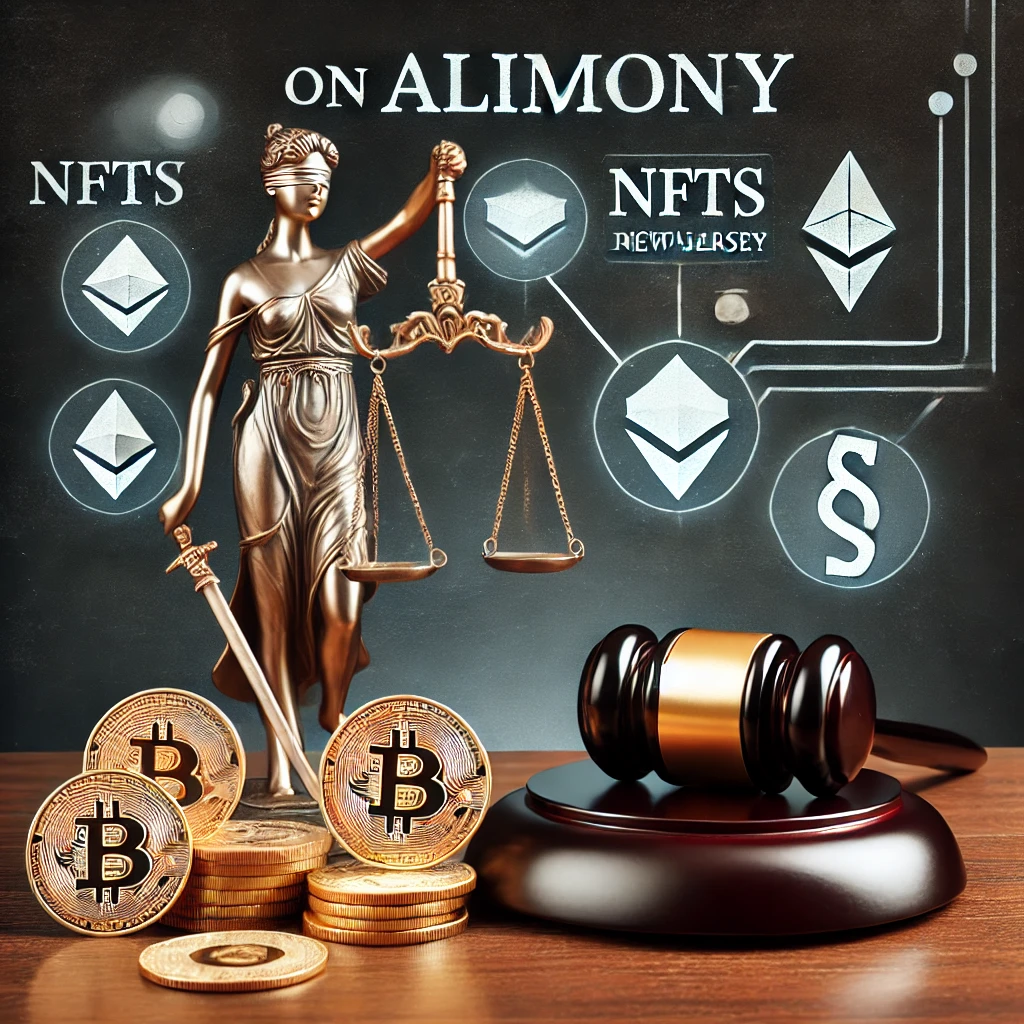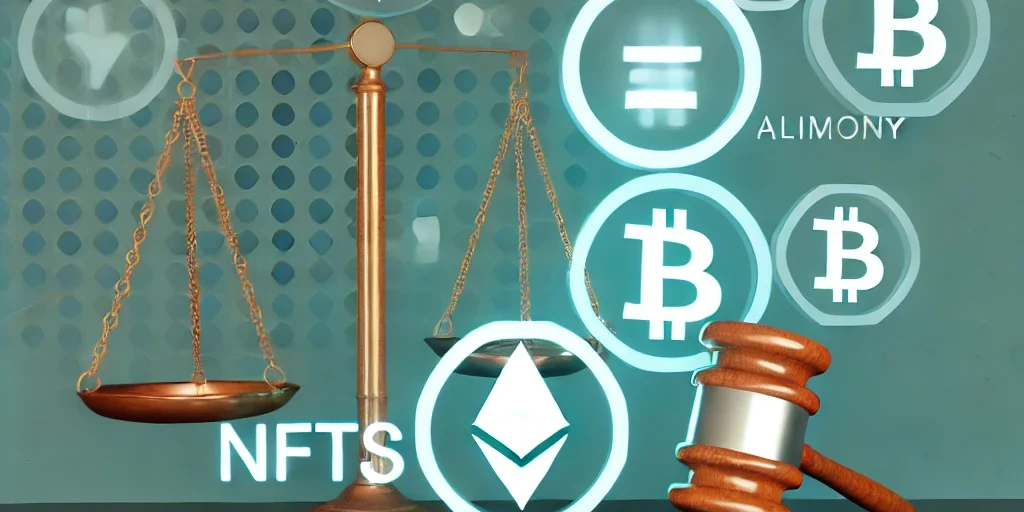Digital assets, such as cryptocurrencies and NFTs (non-fungible tokens), have become an increasingly important part of the financial landscape. As their popularity and value grow, you or your ex may have incorporated these assets into your financial portfolios. But what happens when a couple goes through a divorce? In New Jersey, where equitable distribution of marital assets is the law, digital assets can play a significant role in how alimony is determined.
Let’s explore how NFTs and similar digital assets may affect alimony in a New Jersey divorce.
Key Takeaways
- NFTs acquired during marriage are subject to equitable distribution in New Jersey.
- High-value NFTs can increase alimony obligations due to their effect on total marital wealth.
- NFT-generated income can influence child support calculations and lead to modifications.
- Spouses may hide NFTs; watch for secretive behavior, digital wallets, and unusual withdrawals.
- Consulting an attorney ensures fair asset division and accurate alimony or child support assessments.
NFT and Cryptocurrency Impact on Alimony and Child Support
| Aspect | Alimony | Child Support |
|---|---|---|
| Effect of NFTs on Payment | High-value NFTs can increase alimony obligations | NFT-generated income affects child support calculation |
| Asset Division | NFTs acquired during marriage are marital assets | Part of total wealth considered for support |
| Volatility of Value | Fluctuating NFT values complicate alimony amount | Significant changes may lead to support modification |
| Income Generation | NFT sales could impact payer’s financial profile | NFT income added to parent’s income for support |
| Recommendation | Obtain expert appraisal and legal guidance | Disclose all digital assets for fair calculations |
What is an NFT?
Also known as “non-fungible tokens,” NFTs are a digital asset created with blockchain technology that represents art, videos, and music. NFTs are typically purchased with a form of cryptocurrency. “Non-fungible” means that the unit purchased is unique, and depending on the smart contract included, may be able to replicate the NFT (a process called “breeding”). This is verified with a unique digital signature.
To prove how valuable NFTs can be, the market value of the industry was $2.1 billion during the second half of 2021.

Can NFTs Count as Assets in Divorce?
Can NFTs Count as Assets in Divorce?
Yes, NFTs may count as an asset during divorce, and if they are, will be subject to equitable distribution, as per New Jersey law. This means that any property—digital assets included—acquired during the marriage is divided fairly (not equally) between the spouses. Depending on the NFT, it may have significant value and will be considered a part of marital estate if purchased during the duration of said marriage. Therefore, having digital assets can also impact alimony and child support payments.
Signs a Spouse May Be Using NFTs as Hidden Assets
In high net worth divorce in New Jersey, it is not uncommon for one party to attempt at hiding funds from the other. Here are some signs that your spouse is hiding their NFT collection:
Digital Wallets and Crypto Exchange Apps
Because NFTs are typically purchased with cryptocurrency, most collectors will have some form of crypto exchange on their phone, such as Coinbase.
Large Cash Withdrawals on Bank Statement
Sometimes NFTs or cryptocurrency can be traded for cash. If you notice recurring withdrawals around a similar cost, it may be a red flag that your spouse has transferred funds into a digital asset. Another possibility is using PayPal to hold the funds, particularly after selling NFTs.
Secretive Behavior About Statements
If your spouse displays questionable behavior about their banking and credit statements, you may want to consider that they are hiding assets from you. This can happen with any form of asset. It is important to let your attorney know if your spouse is hiding their statements, as the NJ divorce lawyer can request that those documents be produced as evidence, so you can confirm if they have been buying or selling NFTs secretly.
Following NFT and Crypto Accounts
Check to see who your ex follows on their social media accounts. If there is a large number of cryptocurrency or NFT accounts, they may be trading in these digital assets furtively.
Can NFTs Influence Alimony and Child Support?
The short answer is yes. Ownership of digital assets and cryptocurrency will influence how much alimony or child support must be paid (or received). Let’s take a look at how NFTs may change alimony and child support:
Alimony
Alimony, or spousal support, is a financial payment made from one spouse to another following a divorce, intended to help the lower-earning spouse maintain a lifestyle comparable to what they experienced during the marriage. New Jersey courts determine alimony by considering factors like earning capacity and income; standard of living during the marriage; assets and liabilites; and the duration of the marriage.
If one or both spouses acquired NFTs or cryptocurrencies during the marriage, those assets are considered part of the marital estate. High-value digital assets can increase the total wealth subject to equitable distribution, potentially affecting the alimony amount. For example, if a spouse has amassed a large portfolio of valuable NFTs, it could increase their overall financial standing, leading to higher alimony obligations.
That said, complications may arise when determining the value of NFTs. Despite a high collective market value, the value of individual NFTs—along with the cryptocurrency often used to buy them—fluctuates vigorously. . This volatility can affect how the court calculates the overall value of the marital estate and, subsequently, the alimony award. Spouses may need expert appraisals to establish a fair value for digital assets at the time of the divorce.
Child Support
Child support is calculated similarly to alimony, along with some additional factors, like the age of the child, their needs, and education. A parent’s income will also alter how much child support is received. As such, if the NFTs owned generate income—whether through sales, royalties, or appreciation in value—the court may consider this as part of the parent’s income. For example, if a parent regularly buys and sells NFTs for a profit, the earnings could be added to their income and factored into child support calculations.
Now, if the value of NFTs significantly increases or decreases over time, either parent may request a child support modification. For example, if a parent’s NFTs drastically appreciate and lead to increased income, the other parent might petition for higher child support. Conversely, if the NFTs lose value, the paying parent may seek a reduction in payments.
Contact an NJ Divorce Attorney Today
As digital assets like NFTs continue to grow in popularity and value, they are becoming an important factor in divorce proceedings, including the determination of alimony and child support in New Jersey. Whether it’s ensuring equitable distribution of NFTs or calculating the impact of these assets on spousal and child support payments, understanding how digital assets fit into your divorce case is crucial.
If you’re facing a divorce involving digital assets, it’s important to seek legal advice. The experienced attorneys at Ziegler Law Group, LLC, can help you navigate the complexities of NFTs, cryptocurrencies, and other financial aspects of divorce. Contact us today for a consultation and let us guide you through this challenging process with confidence and clarity.
FAQ Section
1. Are NFTs considered marital assets in a New Jersey divorce?
Yes, if acquired during the marriage, NFTs are considered marital assets in New Jersey and subject to equitable distribution. Their value can affect asset division, alimony, and child support calculations.
2. How do NFTs influence alimony in a New Jersey divorce?
High-value NFTs can increase the total marital estate, potentially raising the alimony obligation for the higher-earning spouse. However, the fluctuating value of NFTs can complicate their assessment, requiring expert appraisal.
3. Can NFTs impact child support payments?
Yes, if NFTs generate income, such as through sales or royalties, they may be included in income calculations for child support. Significant changes in NFT value may lead to modifications in support payments.
4. How can I tell if my spouse is hiding NFTs during our divorce?
Look for signs like digital wallets, large cash withdrawals, secrecy around financial statements, or frequent interactions with NFT and cryptocurrency platforms. Inform your attorney if you suspect hidden assets.
5. Should I consult an attorney about NFTs in my divorce case?
Absolutely. NFTs and digital assets are complex, volatile, and require expert evaluation in divorce cases. An experienced attorney can help ensure fair asset division and accurate financial assessments.






